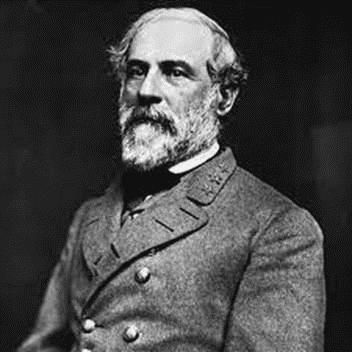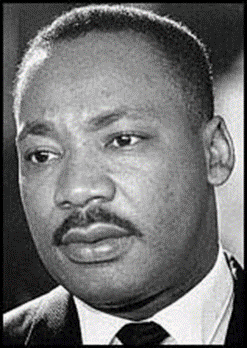January 19, 2023
MY CORNER by Boyd
Cathey
Robert E. Lee, MLK,
and Russell Kirk: No “House United”
Friends,
January 19 is the anniversary of the birth of General Robert
E. Lee, perhaps the greatest military commander the United States (or the
Confederate States) has ever produced, and certainly one of finest Christian
gentleman in the two millennia history of our Western civilization. I was
intending to write a piece commemorating that signal event—and the general’s
continuing importance, despite the insanely ignorant, frenzied and vicious
attacks on him in recent years.
But I have written on Lee previously, and others have done so
expertly on his anniversary. And thinking about how far as a people we have
descended, how we have allowed our history and traditions to be wrenched away
from us, how we have allowed in a real sense actual traitors to our culture and
our inheritance to poison and infect that heritage and denounce it as racist
and bigoted, akin to the worse features of Naziism…thinking about that, I
returned to the essay I published on January 13 of this year, titled “MLK,
Russell Kirk, and the Ignominy of Modern Conservatism.” That
column, part of the MY CORNER by Boyd Cathey series, has already had substantial
exposure. It was picked up by THE UNZ
REVIEW, THE
ABBEVILLE INSTITUTE, VDare
Twitter, Ilana Mercer’s “Barely-a-Blog,” and
several other outlets, including several overseas. So, it’s not like readers
need to read it once again.
But thinking about Lee, taken down now so criminally from atop
his well-deserved monuments, while Martin Luther King is hoisted over and over
again onto his pedestal of foul feculence, and how we are commanded to bow down
to him like slaves to the god Baal, I could not help but recall that latest barbarity,
the latest fanatical assault on the central core of our “permanent things.” For
King represents in nearly every way not only the antithesis of Robert E. Lee,
but also of Russell Kirk, and of those heroes we once held high as exemplars of
the finest men of our history.
I recall a conversation I had with Kirk back when I was his
assistant in Mecosta, Michigan, in the fall of 1971. Russell compared Lee to
the noble “Chevalier sans peur et sans reproche” [“the knight without fear and
without reproach”], the Knight Pierre de Bayard of the late 15th
century. I had never heard of Bayard, but reading up a bit I came to see what
Kirk was saying. Those noble characteristics that Bayard exhibited went far
beyond knightly routine; they were, in a way, almost supernatural in quality.
And Robert E. Lee, in Russell Kirk’s estimation, had filled a similar role in
the difficult history of the American nation.
Now it is Kirk’s turn to have his legacy, his life, and his
essential views emulsified into a smelly porridge, unrecognizable,
undigestible, but oh-so-politically-correct, and thus, just maybe acceptable to
some on the Left and to the self-congratulatory “modern conservative movement":
“Look, everyone, we aren’t racists! And old Russell who said all those nasty
things back in the 1950s, ‘60s, ‘70s, and ‘80s, well, look at him now! We’ve
tidied him up!”
That purification process has not yet been attempted on Lee,
for he may well be outside the realm of “trans” possibilities. But for Lee
admirers like Russell Kirk, by all means, due to his relative position in the
history of American Conservatism, something had to be done.
Thus, in this column I discuss in particular and in a bit more
detail the flagrant abuse of the legacy and beliefs of Dr. Kirk. Just recently
(January 16) the Russell Kirk Center for Cultural Renewal—the organization
established in his name to supposedly perpetuate his ideas and vision for
Western civilization—forcibly conjoined “the Sage of Mecosta” with black
activist, John Woods Jr. in a special Martin Luther King Day event co-sponsored
by the Acton Institute of Grand Rapids. The object? To somehow combine “Kingian
nonviolence with Kirkian Conservatism,” to somehow forge a “communitarian”
consensus and bring “right and left” together.
Of course, and let’s sit down with Rachel Maddow and Al
Sharpton over a couple of beers and just compromise our “differences” away. My
advice is not to invite partisans of Lucifer over to lunch (or visit them in
their caves) and attempt to find consensus with them: you lose every time and
end up their prisoner.
I recall a quote that Russell sometimes cited. It is by the 17th
century writer Sir Thomas Browne, from his volume, Religio Medici.
Although I do not have the exact citation, it goes something like this: “Not
every man is a fit champion of Truth. Many there are who, reckless without
wisdom and prudence, charge the enemies of Truth, but remain prisoners
thereof.”
A mesalliance between Kirk and King is not just inconceivable,
but is rather a direct and especially gross insult to both the memory and the
philosophy of my former mentor and friend for twenty-seven years, for whom I
spent a fruitful year as his assistant (1971-1972) in the wilds of central
Michigan.
King is not worth the spittle spewed from the mouth of Kirk…or
of Lee.
Here is my slightly revised
essay:
*****
The
latest ideological outrage perpetrated within the “conservative movement” has
been the “cleansing” inflicted on Russell Kirk, who is credited with founding
the movement back in the early 1950s. And it arrives with the sponsorship and
imprimatur of the institution heralding his name, The Russell Kirk Center
for Cultural Renewal, which hosted a joint conference with the Acton Center
in Grand Rapids, on Monday, January 16, featuring black activist John Woods,
Jr. Woods’ Web site, Braver Angels,
declares that his own organization is dedicated to “healing
the wounds between left and right…. At Braver Angels, our work is about
building a house united.” (A photo of glassy-eyed Clinton and Trump
supporters from 2016 decorates his site.)
Here is a portion of the invitation
from the Kirk Center (signed by Jeff Nelson, the CEO of the Center):
Without King and Kirk, modern American Social
Justice liberalism and modern American conservatism as we know them would not
exist. And yet, for all of their differences, our modern politics suffer
because contemporary liberalism and conservatism often lack the grounding in
virtues, communitarian values and faith in an ordered universe to which both
Kingian Nonviolence and Kirkian Conservatism held fast. Is it possible that by
reacquainting ourselves with these lost traditions we could summon the better
angels of left and right and restore a politics of virtue for the modern age?
This inanity is built on blatant intellectual legerdemain. How can my old friend Jeff write such words with a
straight face and without blushing embarrassment?
Once individuals such as Kirk were thought too philosophically
unwieldy to be incorporated into the budding pantheon of conservative political
correctness. Although usual pro forma tributes regularly praised his
earlier achievements, his unfavorable views of King, his opposition to civil
rights legislation, his consistent arguments against egalitarianism, his
opposition to the rabid anti-colonialism of the 1950s and 1960s, and his anger
directed at George H. W. Bush (he was Pat Buchanan’s campaign chairman in
Michigan in 1992 at the same time I headed the Buchanan effort in North
Carolina) are significant markers which must be catalogued.
From fall 1967 for twenty-six years, I corresponded with
Russell. As chairman of the Visiting Lecture Program at Pfeiffer University I
managed to bring him down for a weekend. Then, after completing an MA in 1971
as a Thomas Jefferson Fellow at the University of Virginia, Kirk requested that
I travel to Mecosta to serve as his assistant for 1971-1972. Editing Kirk’s
little educational quarterly, The University Bookman, was one of my
major responsibilities. In its pages he insisted on open debate on such topics
as cognitive disparities between the races (he published a review of Dr. Audrey
M. Shuey’s study, The Testing of Negro
Intelligence, and other politically-incorrect volumes).
In the spring of 1972 one night we sat in his library as the
results of the Michigan Democratic presidential primary came in. I had a radio,
and at Russell’s urging I brought it down from my room on the second floor of
the library building. Kirk applauded George Wallace’s upset victory, although I
don’t think he desired that his wife find out!
While at the University of Virginia I completed a semester
paper titled, “Robert Lewis Dabney and the New South Creed.” Russell knew
little of Dabney, save for what he had read in Richard Weaver’s The Southern
Tradition at Bay. But he read my essay, liked it very much, and suggested I
send it to David Collier, then editor at Modern Age. I did just that,
and Collier responded, tentatively accepting it for publication, but with a
couple of minor editing suggestions.
Unfortunately, I never got around to those edits. Yet, since
then I have gone back to work on the paper, and it has found outlets in several
publications.
One particular passage that caught Kirk’s attention and
interest was Dabney’s acute and prophetic description of American conservatism.
Written as part of Dabney’s response against efforts to enact women’s suffrage,
Kirk wrote to me in the early 1990s—the George Bush years—that he was especially
delighted in this passage, marveling that Dabney could have been so prescient a
full century earlier (1875):
This is a party which never conserves anything. Its history has
been that it demurs to each aggression of the progressive party, and aims to
save its credit by a respectable amount of growling, but always acquiesces at
last in the innovation. What was the resisted novelty of yesterday is to-day
one of the accepted principles of conservatism; it is now conservative only in
affecting to resist the next innovation, which will to-morrow be forced upon
its timidity, and will be succeeded by some third revolution, to be denounced
and then adopted in its turn.
American conservatism is merely the shadow that follows Radicalism
as it moves forward towards perdition. It remains behind it, but never retards
it, and always advances near its leader. This pretended salt hath utterly lost
its savor: wherewith shall it he salted? Its impotency is not hard, indeed, to
explain. It is worthless because it is the conservatism of expediency only, and
not of sturdy principle. It intends to risk nothing serious, for the sake of
the truth, and has no idea of being guilty of the folly of martyrdom. It
always—when about to enter a protest—very blandly informs the wild beast whose
path it essays to stop, that its ‘bark is worse than its bite,’ and that it
only means to save its manners by enacting its decent rôle of resistance.
The only practical purpose which it now subserves in American
politics is to give enough exercise to Radicalism to keep it ‘in wind,’ and to
prevent its becoming pursy and lazy from having nothing to whip. No doubt,
after a few years, when women's suffrage shall have become an accomplished
fact, conservatism will tacitly admit it into its creed, and thenceforward
plume itself upon its wise firmness in opposing with similar weapons the
extreme of baby suffrage; and when that too shall have been won, it will be
heard declaring that the integrity of the American Constitution requires at
least the refusal of suffrage to asses. There it will assume, with great
dignity, its final position. [Dabney, “Women’s Rights Women,” The Southern Magazine, 1871.]
The present nugatory “conservative movement” has no room for
the real Russell Kirk. His fundamental beliefs and views are now
discreetly ignored, or simply redacted, and he emerges fully purified of his
earlier inequities and stains of racism.


